Microorganisms II -> creativity
Creativity in Biology
Creativity is an essential aspect of biology that involves the development of new ideas, concepts, and solutions to biological problems. It is a crucial skill in the field of biology as it allows scientists to think critically, solve complex problems, and make innovative discoveries.
Understanding Creativity in Biology
In biology, creativity can manifest in various ways, such as:
- Experimental Design: Developing novel experimental approaches to answer biological questions.
- Hypothesis Generation: Formulating new and innovative hypotheses to explain biological phenomena.
- Data Analysis: Using creative and unconventional methods to analyze and interpret biological data.
- Model Building: Developing new biological models that enhance our understanding of complex biological systems.
- Problem Solving: Finding innovative solutions to biological challenges and issues.
Stimulating Creativity in Biology
To enhance creativity in biology, students can engage in various activities, such as:
- Exploring Diverse Biological Topics: Encouraging students to explore a wide range of biological topics and disciplines to broaden their perspective and stimulate creative thinking.
- Hands-On Experiments: Providing opportunities for students to engage in hands-on experiments and research projects that encourage independent thinking and problem-solving.
- Critical Analysis: Encouraging students to critically analyze existing biological theories and concepts, leading to the development of new ideas and solutions.
- Interdisciplinary Approaches: Integrating knowledge from different scientific disciplines to foster creativity in addressing complex biological problems.
Study Guide for Creativity in Biology
As a student studying biology, consider the following tips to enhance your creativity:
- Explore Diverse Biological Topics: Take the initiative to explore various biological topics beyond your curriculum to gain a broader understanding of the field.
- Engage in Independent Research: Seek opportunities to conduct independent research projects or experiments to develop your problem-solving and creative thinking skills.
- Participate in Science Competitions: Participate in biology-related science competitions or events that challenge you to think creatively and innovatively.
- Collaborate with Peers: Collaborate with your peers to discuss and exchange ideas, fostering a creative and stimulating environment for learning.
- Seek Mentorship: Seek guidance from biology educators or professionals who can provide mentorship and encourage your creativity in the field.
By embracing creativity in biology, you can contribute to the advancement of scientific knowledge and make meaningful contributions to the field.
[Creativity] Related Worksheets and Study Guides:
.◂Biology Worksheets and Study Guides High School. Microorganisms II
Worksheet/Answer key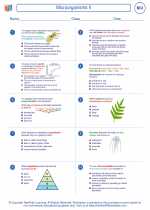 Microorganisms II
Microorganisms II  Worksheet/Answer key
Worksheet/Answer key Microorganisms II
Microorganisms II  Worksheet/Answer key
Worksheet/Answer key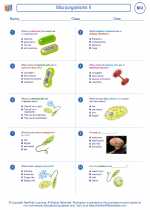 Microorganisms II
Microorganisms II  Vocabulary/Answer key
Vocabulary/Answer key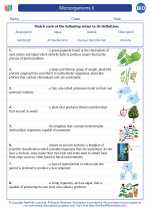 Microorganisms II
Microorganisms II  Vocabulary/Answer key
Vocabulary/Answer key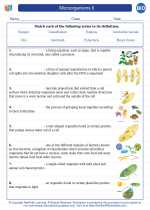 Microorganisms II
Microorganisms II  Vocabulary/Answer key
Vocabulary/Answer key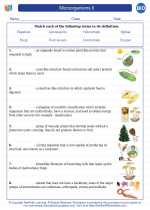 Microorganisms II
Microorganisms II  Vocabulary/Answer key
Vocabulary/Answer key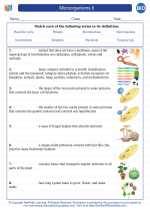 Microorganisms II
Microorganisms II  Vocabulary/Answer key
Vocabulary/Answer key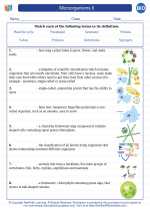 Microorganisms II
Microorganisms II 

 Worksheet/Answer key
Worksheet/Answer key
 Worksheet/Answer key
Worksheet/Answer key
 Vocabulary/Answer key
Vocabulary/Answer key
 Vocabulary/Answer key
Vocabulary/Answer key
 Vocabulary/Answer key
Vocabulary/Answer key
 Vocabulary/Answer key
Vocabulary/Answer key
 Vocabulary/Answer key
Vocabulary/Answer key

The resources above cover the following skills:
Life Science
Organization and Development of Living Organisms - A. Cells have characteristic structures and functions that make them distinctive. B. Processes in a cell can be classified broadly as growth, maintenance, reproduction, and homeostasis. C. Life can be organized in a functional and structural hierarchy ranging from cells to the biosphere. D. Most multicellular organisms are composed of organ systems whose structures reflect their particular function.
Relate the major structure of fungi to their functions.
Diversity and Evolution of Living Organisms - A. The scientific theory of evolution is the fundamental concept underlying all of biology. B. The scientific theory of evolution is supported by multiple forms of scientific evidence. C. Organisms are classified based on their evolutionary history. D. Natural selection is a primary mechanism leading to evolutionary change.
Discuss distinguishing characteristics of the domains and kingdoms of living organisms.